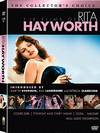





Teresa Wright
Biography | Filmography | Awards | Articles | Remembering | Bibliography | Gallery | News | Downloads | Links | Image Credits | THE LITTLE FOXES | MRS. MINIVER | SHADOW OF A DOUBT | THE PRIDE OF THE YANKEES | THE BEST YEARS OF OUR LIVES
| Interview: | Excerpt 5 |
Reminiscences of Teresa WrightNew York, June 1959On William Wyler. . . he didn't give you anything particularly himself, except that you felt that he was going to make you give something to him. He required a certain something from you that he seemed to be unable to put into words. I sometimes wonder if he really was unable to, or whether his method is that he does not want to impose himself or any other ideas on you, because he's waiting to see the right thing come out of you. . . . Willie Wyler directed the first two pictures I did, "Little Foxes" and "Mrs. Miniver," and I found him wonderful to work with, yet I can't tell you what he gave me -- unlike Kazan, who gives you so much. Q: He shoots so much extra footage, people sometimes say he does really know what he wants.I know -- I've heard that. Well, it's true. I guess it's like the old thing even Willie used to say about Goldwyn -- "He doesn't know what he wants but he knows what he doesn't want, and he's so right about that that it turns out well." It's hard to say about Willie. I don't know how much of it is like with Stevens and Sam Wood, who also did that. They were brought up in the time of missions of shots for a thing, then choosing, and putting it together in the cutting room. But the difference between someone like Wyler and someone like Sam Wood -- Wyler was the first one out there (so far as I know) really to use a certain amount of stage technique in doing a film. He would rehearse for two weeks, which in those days was unheard of, most places. He knew by the time we got there exactly what he wanted from us in the way of performances, and we knew too what he wanted. He would stage it, and he worked with a great cameraman, Gregg Toland, who was able to get these things for him -- shots that I've not found any director since doing as well, where you had a whole roomful of people, and someone would enter in the doorway, and someone would be way right of frame, way left of frame or way foreground. All of these people, and what their reactions were, would be important to the scene, and you would see them all at once, and the camera would move in, if he wanted a close-up, and move back again. It would be absolutely fluid. The only thing comparable to it, that I've found, is live television, and even then it isn't one camera that's doing it; it's three or four. So, I've not found anyone who could meet him on that score. And you would think that having done that, he would use very little film. But somehow, whether it's a kind of self-doubt he has, of not being sure, or whether it's the old thing of just wanting to see it all up on the screen, I don't know -- he's a great one for really taking forty takes and then using the first one, but sometimes he doesn't. Sometimes there's some quality which he keeps waiting for someone to give. He hates to tell somebody what to do, in a way, because Willie is one of those men, like many men, who hate acting. They want it somehow to become real. They want it to happen -- you know. He hates hamminess, he doesn't like many stage plays or many stage actors. He feels they "act." In a way, he'd rather get somebody off the street and make him give him, by accident maybe, the reaction he wants, which is not any deep appreciation of actors as such -- but he's not interested in actors as such. He's interested in creating an effect on film, and that's what he does -- used to do -- I think, so beautifully. I've been frankly disappointed, over the past few years. You start out just to make a big picture -- you do it great, probably better than most people -- but it isn't quite the same as I think he had when he was younger and more interested really, in making a film, in a certain thing he wanted to create on the screen. To me, I can't see how it makes much difference whether Willie Wyler or someone else makes "Ben-Hur." © 1959 Columbia University and the Oral History Research Office |
|
Return to the Interview Excerpts
Table of Contents. |
| Now in Print! |
|---|
| Now on DVD! |
|---|
Buy Videos & DVDs |
|
Buy Movie Posters |
|
Buy Movie Posters |
|
Classic
Movie Merchandise |
|
![]() Printer-friendly version.
Printer-friendly version.
![]() Return
to the top.
Return
to the top.
Last updated:
March 10, 2011.
Reel Classics is a registered trademark of Reel Classics, L.L.C.
© 1997-2011 Reel Classics, L.L.C. All rights reserved. No
copyright is claimed on non-original or licensed material.
Terms of
Use.









